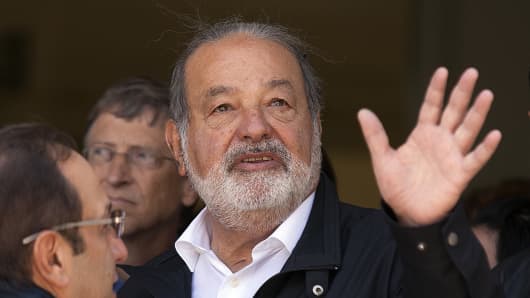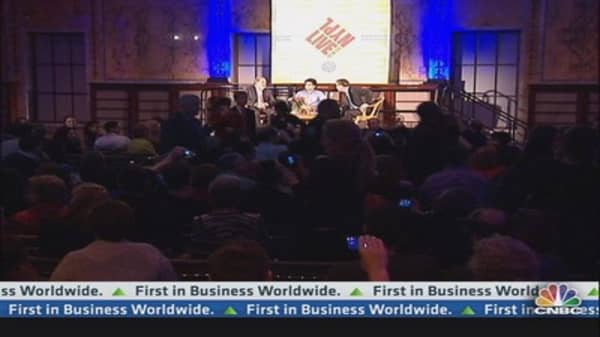California officials are set to decide whether or not they will investigate an organization running a campaign against one of the world's richest men, Mexican telecom magnate Carlos Slim. The California Fair Practices Commission, an independent body that enforces the state's campaign and lobbying finance law, will likely decide by early next week if there is enough evidence to investigate "Two Countries, One Voice."
TCOV, whose founders describe it as a "loose coalition," operates a website called Slimmustgo.com, and has mounted protests in California, Nevada, Washington and New York. According to its website, it is "driven by a desire to expose how the richest man in the world…continues to amass his wealth on the backs of the Mexican people."
Executives at Slim's U.S. phone company, Tracfone, filed a complaint with the commission in mid-May, accusing TCOV of being an "astro-turf" organization—lobbyist vernacular for groups that pretend to be "grass-roots" and independent, but instead are backed financially by third parties with a vested interest. If true, it could be a violation of California laws which require financial disclosures for lobbying activity. The complaint outlines a series of protests by TCOV, some attended by politicians in California, and suggests connections between those politicians and Mercury Public Affairs, a lobbyist organization.
Roger Salazar of Mercury Public Affairs, mentioned in the complaint, told CNBC "There is no connection whatsoever."
Andres Ramirez, also mentioned in the complaint, and one of the founders of TCOV, told CNBC "I am dumbfounded by these accusations. These linkages don't exist."
(Read More: What Motivates World's Richest Man, Carlos Slim? 'Not Money')
Two Countries, One Voice most recently conducted a protest at the New York Public Library when Slim appeared on stage with Salman Khan, founder of Khan Academy. The two were there to discuss Slim's decision to fund Spanish-language versions of Khan's well-known online educational videos. Each time Slim spoke, a group of roughly 30 people laughed repeatedly. About 30 minutes into the event, a man stood up and said "I'll tell you what's funny, Carlos Slim's charity is laughable." Those behind the laughter stood up, and marched out as they played what they said was Darth Vader theme music on kazoos.
When approached by reporters, the protesters were evasive, and several declined to answer questions. A man who identified himself as Andy Bichlbaum, and who said he was a member of a group called "The Yes Men" said he wasn't sure who the organizers were. Ramirez attributes the evasiveness to mistrust of reporters. "These activist groups have a general distrust of the media," he said.
America Movil, the company founded by Carlos Slim, controls 80 percent of land lines in Mexico, and 70 percent of the wireless market. Slim has long been criticized as a monopolist—a term he refutes because there are multiple suppliers of telephone services in Mexico.
(Read More: 2 Giants Likely to Weather Mexican Telecom Reform)
Ramirez, who runs a public affairs and marketing business in Las Vegas, says he was motivated by a recent report from the OECD, the Organization for Economic Cooperation and Development. The report is deeply critical of Mexico for what it says is lack of competition that costs the Mexican economy $25 billion a year, because prices would otherwise be lower.
America Movil refutes the report in a presentation on its website, criticizing its methodology, including the use of an incorrect peso-dollar exchange rate, and its ignoring of purchasing price parity, which is considered by many economists as a better measure of cost.
An annual report by Bank of America Merrill Lynch shows that revenue per minute has declined steadily in Mexico since 2003 and now stands at 4 cents per minute, equal to the average for other emerging markets, and below the average for the rest of the world and Latin America. The same report says wireless penetration in Mexico is 86 percent, below the world average of 93.7 percent and the Latin American average of 117 percent. (Many people in Latin America, and elsewhere, carry more than one phone.)
Late last month the Mexican Congress passed a new communications law which takes aim at both Slim's empire, and also Televisa, the dominant television network which also commands overwhelming market share. The law creates a new regulatory body which has the power to break up the two companies if it wants to, though it is not clear that is the remedy it will seek.
(Read More: Bad Economy Sends Spaniards Packing for Latin America)
TCOV conducted two protests after the new law was passed. "We are certainly not unaware of the legislative reforms," says Ramirez, adding "That process is not complete yet."
—By CNBC's Michelle Caruso-Cabrera. Follow her on Twitter: @MCaruso_Cabrera





